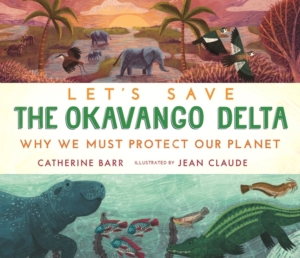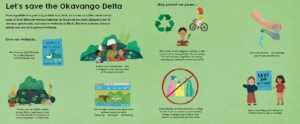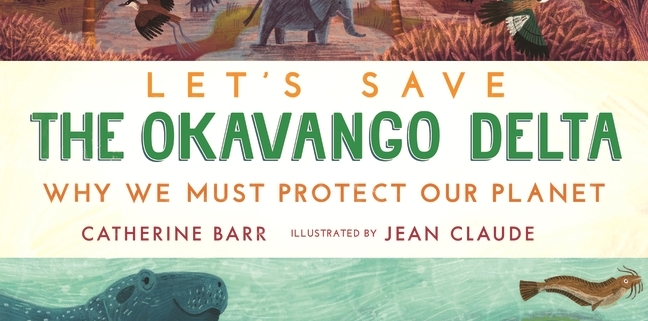Let’s Save Okavango Delta by Catherine Barr
The Let’s Save series by Catherine Barr has highlighted some of the world’s most wondrous places and the need to protect and save them. The Okavango Delta is the newest in the series and Catherine has written an inspiring blog for us!

Long ago, I balanced in a narrow canoe gliding across a patch of open water as our guide tapped the side of the boat. Curious hippos surfaced and we staredwith trepidation at their twitching ears and bulbous eyes. These underwater giants are dangerous and I did not want to swim. Thankfully our guide memorised a safe passage to avoid gliding over hippos. This life-saving skill helps visitors safely navigate adventure in this watery wilderness. An oasis of the Kalahari Desert in Botswana.
My experiences in this ‘Jewel in the Kalahari’ have stayed with me. In choosing the fourth iconic habitat for the Let’s Save… series with Walker Books (following the Amazon, Antarctica and the Great Barrier Reef), the Okavango Delta was an important, if not obvious-to-all choice.
Wetlands are less familiar and less talked about, but around the world, these extraordinary, wildlife rich habitats are disappearing three times faster than forests. They are climate change hot spots and vital carbon sinks. As the UN recently declared: There is an urgent need to raise global awareness on wetlands to reverse their rapid loss and to encourage the restoration and conservation of these vital ecosystems.
The Okavango Delta is an inland delta: its waters simple trickle into the sands, never reaching the sea. Every year, the Delta floods, doubling in size. The greatest concentrations of wildlife on Earth seek its cool pools and waterways to drink, mate and play. More then five thousand elephants arrive each year, on long migration journeys across this arid land.
Elephants play an important role in the ecosystem but hippos are the heroes in this wetland world. These eco-engineers alter the landscape with their daily swims. They push and paddle through tangles of fast-growing water lilies, keeping channels open and water flowing across the land.
The Okavango Delta is protected as a UNESCO World Heritage Site for its biodiversity as well as indigenous communities whose way of life depends on its seasonal cycles. Annual floods depend on rivers that wind across Angola and Namibia to reach northern Botswana each year. This distant source of water is critical to the survival of the Okavango, its wildlife and people. But it is increasingly under threat. Big dams are altering the flow of the mighty Okavango River, and large-scale farming and industry developments threaten to divert water upstream.
In telling the story of the Okavango, I sought expertise from scientists working in the Delta and the National Geographic Okavango Wilderness Project team, dedicated to securing its protection and sustainable future.
This autumn I am returning to southern Africa; to join the Gaborone Book Festival in Botswana and at the kind invitation of the National Geographic team, to share my book with communities in the Delta. I so look forward to meeting and learning from local people and world experts in wetland ecology, African wildlife and community conservation.
But most of all, from celebrating World Wetlands Day (2 February) to exploring local wetland habitats or planning a Wetland Wonders assembly at school, I hope Let’s Save the Okavango Delta empowers its readers to share stories, discover and protect our wonderful watery worlds.

Let’s Save Okavango Delta is published by Walker Books and is available now.
Views expressed do not necessarily reflect those of the Federation.




